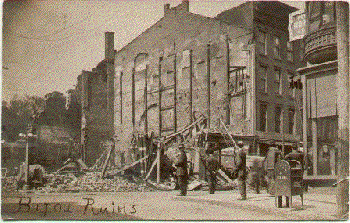Encyclopedia Dubuque
"Encyclopedia Dubuque is the online authority for all things Dubuque, written by the people who know the city best.”
Marshall Cohen—researcher and producer, CNN
Affiliated with the Local History Network of the State Historical Society of Iowa, and the Iowa Museum Association.
BIJOU THEATER: Difference between revisions
No edit summary |
No edit summary |
||
| Line 1: | Line 1: | ||
[[Image:THEATERHISTORY.png|left|thumb|250px|Theater History. Courtesy: Telegraph Herald]] | |||
[[Image:bijou2.jpeg|left|thumb|250px|Bijou Theater at 4th and Main. Photo courtesy: Frank and Vincent Hoffmann Collection and Diane Harris]] | [[Image:bijou2.jpeg|left|thumb|250px|Bijou Theater at 4th and Main. Photo courtesy: Frank and Vincent Hoffmann Collection and Diane Harris]] | ||
[[Image:bij3.jpg|left|thumb|250px|Interior of Bijou in 1910. Photo courtesy: Joseph Jacobsmeier]] | [[Image:bij3.jpg|left|thumb|250px|Interior of Bijou in 1910. Photo courtesy: Joseph Jacobsmeier]] | ||
Revision as of 19:59, 9 February 2018
BIJOU THEATER. The Bijou was a famed Dubuque theater located on the northwest corner of Fourth and Main STREETS and the successor to the COATES OPERA HOUSE.
In 1904 Jacob Rosenthal, of Siegfried and Rosenthal of Omaha, Nebraska, was hired by the building owners to take over its management. Under his leadership, the Coates became a vaudeville house with its opening night November 14, 1904. From then until June 1905, the theater daily presented a two-hour afternoon and two-hour evening performance with an admission price of ten cents. Six musical numbers were presented at each performance. The infamous Cherry Sisters whose "singing" often led to fruit and other produce being thrown at them were booked in 1906. In February 1907 Rosenthal offered for the fourth time since taking over the theater eight acts in the same week. (1) Ever the businessman, Rosenthal offered such audience-building inducements as twins coming to the theater together having their choice of seating during the second week in January in 1910. (2)
In 1908 the DUBUQUE OPERA HOUSE COMPANY purchased and renamed the building the Bijou Theater. Extensive remodeling began almost immediately. The stage was lowered from the second to the first floor, and four box seats were installed on each side of the expanded stage. The horseshoe-shaped gallery was often the scene of verbal exchanges between the "Packing House Row" on one side and the "Dutchtown Gang" on the opposite side. (3)
The New Bijou, considered one of Iowa's most beautiful, was destroyed by fire on April 7, 1910. Firemen discovered smoke coming from under the stage door. The origin of the blaze was never determined.
The theater owners announced immediately that architects would be arriving the following week to draw plans for a "larger and grander" theater. The actors and actresses left unemployed and in loss of their costumes by the fire sold tickets to a benefit at UNION PARK that was arranged to help them re-establish their acts. Work began on what became the MAJESTIC THEATRE.
---
Source:
1. "At the Bijou," Dubuque Telegraph-Herald, February 3, 1907, p. 6
2. "He Wore Gold Coins in His Vest," Telegraph Herald, October 17, 1937, p. 7
3. "Dubuque Will Have New Bijou," Telegraph Herald, April 9, 1910, p. 3





